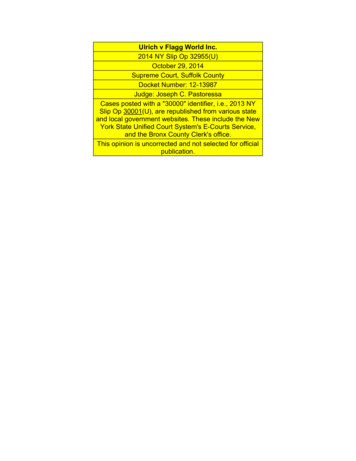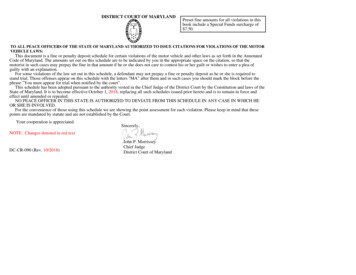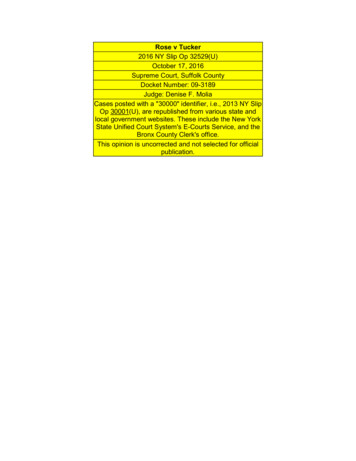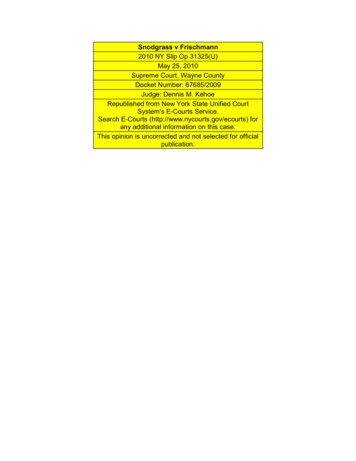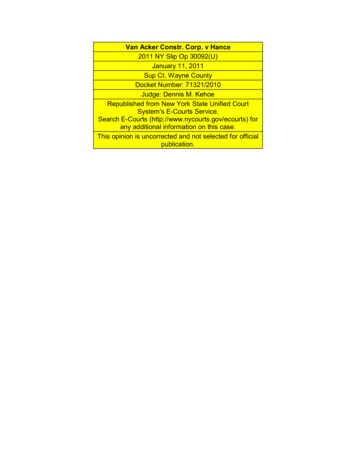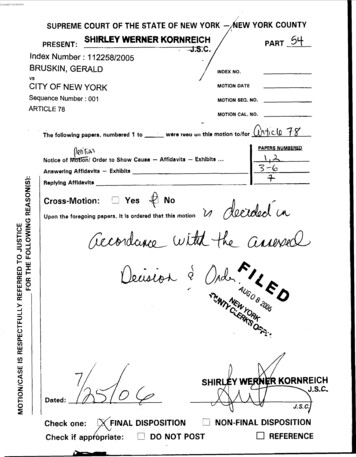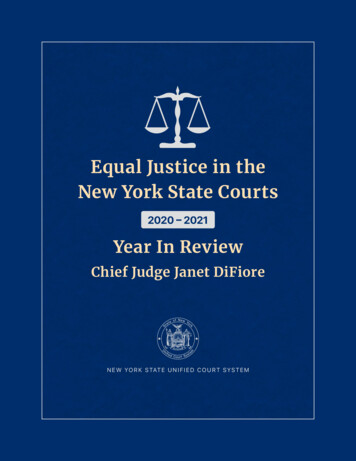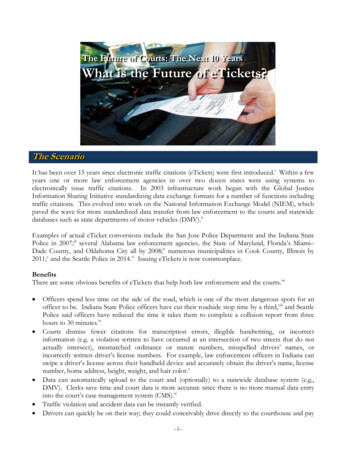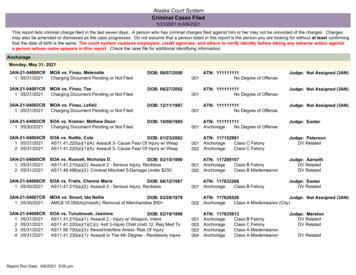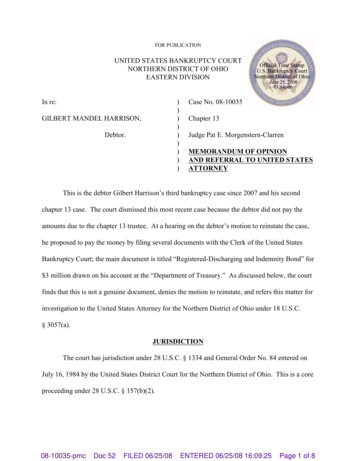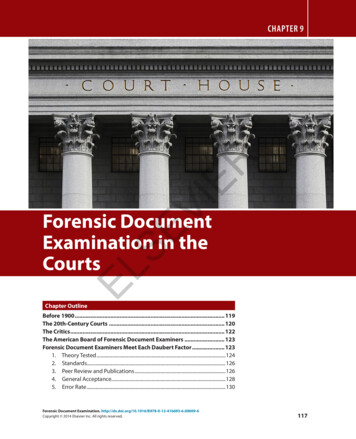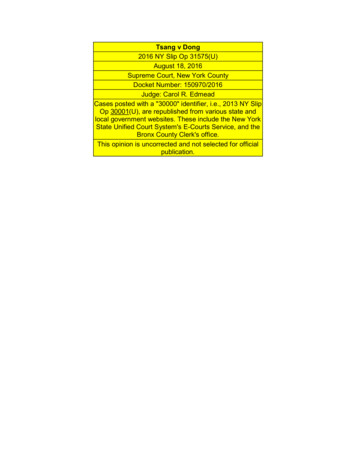
Transcription
Tsang v Dong2016 NY Slip Op 31575(U)August 18, 2016Supreme Court, New York CountyDocket Number: 150970/2016Judge: Carol R. EdmeadCases posted with a "30000" identifier, i.e., 2013 NY SlipOp 30001(U), are republished from various state andlocal government websites. These include the New YorkState Unified Court System's E-Courts Service, and theBronx County Clerk's office.This opinion is uncorrected and not selected for officialpublication.
[*FILED:1]NEW YORK COUNTY CLERK 08/19/2016 10:33 AMNYSCEF DOC. NO. 12INDEX NO. 150970/2016RECEIVED NYSCEF: 08/19/2016SUPREME COURT OF THE STATE OF NEW YORKNEW YORK COUNTYHON. CAROL A. t:OMEADPRESENT:J.S.C.PART-: S-JusticeJSD9 7D ./I MOTION DATE j 't/J pMOTION SEQ. NO.0 tJ IINDEX NO.The following papers, numbered 1 to , were read on this motion to/forNotice of Motion/Order to Show Cause - Affidavits - ExhibitsAnswering Affidavits -Exhibits--------------------------------- Replying A f f i d a v i t s - - - - - - - - - - - - - - - - - - - - - - -I No(s).I No(s). - - - - - 1No(s). - - - - - -Upon the foregoing papers, it is ordered that this motion is.u .-,,.,:J)-:::iLIk::k::LI.I.LI. Uik::z.J.J0::: -u wenLc(),,u z0::C I.'u 03: .J.J' 0tLL)w;2 .J:-)E0::0In this action for defamation and trespass, defendant Yonghan Dong ("defendant") movesfor summary judgment dismissing the complaint of the plaintiffs Bernice Tsang and IvankaWang as agents of Mertz, Bitelman & Associates Law Office, P.C. (the "Firm"), plus costs anddisbursements, for payment of a money judgment issued against the Firm in favor of defendant ina separate matter, and an award on defendant's counterclaims.Factual BackgroundPlaintiffs, managers of the Firm, allege that in July 2008, defendant contacted the Firmseeking an attorney to represent him in a personal injury matter. The Firm referred defendant toMichael Wiseberg ("Wiseberg") and introduced defendant to Wiseberg on July 14, 2008 in theFirm's oflice. Wiseberg and defendant signed a retainer agreement, and collected 200 fromdefendant for travel and parking expenses. Though the Firm did not practice personal injury lawand did not consent to inclusion, Wiseberg added the Firm's name to the retainer agreement.Wiseberg alone handled defendant's matter.On two occasions, when defendant called the Firm to reach Wiscberg and was advisedthat the Firm was not involved in the matter, defendant came to the Firm and harassed andinsulted plaintiffs. In particular, defendant stated, in front of the Firm's clients, that the Firm wasirresponsible, caused him to lose his case, and would not let him sec Wisebcrg; he also stated thathe would not leave the office until he saw Wiseberg. As a result, the Firm's clients weredisturbed, which resulted in a loss of business of at least 87,000.00, as well as damage to theFirm's reputation.LL- - - - - - - - - - - - ' J.S.C. :]OTHERMIT ORDER3. CHECK IF APPROPRIATE: . .0DONOTPOST1 of 70FIDUCIARY APPOINTMENT0 REFERENCE
[* 2]On January 21, 2016, defendant then claimed that plaintiffs or the Firm's staff signed hisname on a stipulation.As a result, plaintiffs commenced this action against defendant for defamation,defamation per se, and trespass, based on defendant's statements made in the Firm's receptionarea in front of the Firm's clients, threat to remain ''in the office forever," and refusal to leaveafter being asked to leave the office.In support of dismissal of the complaint, defendant contends that in 2007, he obtained ajudgment in his favor against the driver of a vehicle (the "offending driver") which causeddefendant property damages. 1 When the offending driver sought to vacate the judgment,claiming he did not receive the summons and complaint, defendant hired Wiseberg on July 14,2008 pursuant to a Fee and Retainer Agreement (the "Retainer Agreement") for the ensuinghearing. According to defendant, the Firm mailed him the Retainer Agreement. 2 Thereafter. onApril 16, 201 L the Firm advised defendant of rescheduled discovery, and defendant did not hearanything about the matter until July 10, 2013, when Wise berg advised defendant that he was nolonger with the Firm and for defendant to contact the Firm for further information. From July2013 through October 2013, defendant was unable to obtain satisfactory answers as to the statusof his case. On December 19, 2013, when the Firm advised defendant that the Firm no longerwas handling his case, defendant visited the Firm's office demanding to speak to the manager.There, the receptionist threatened to call security, but Ms. "Zhang" gave defendantWiseberg's contact information in New Jersey as Wiseberg was the attorney of record. WhenWiseberg's contact information later proved to be invalid, defendant visited the Firm's officeagain on October 10, 2014 to obtain Wiseberg's correct contact information. As a result of theFirm's mishandling of his matter, defendant commenced a Civil Court action against Wisebergand the Firm on October 17, 2014, and obtained a judgment in his favor after trial for 519.63.Defendant argues that the defamation claim is time-barred under the one-year statute oflimitations as to any statements made prior to one year before this action was filed on February 4,2016. Also, the claim is subject to dismissal for failure to allege the date and time of the allegedstatements made in the Firm's office. Further, the trespass claim also fails as a matter of lawbecause plaintiffs alleged no physical damage to their office. And, under the doctrine of resjudicara, plaintiffs claims are barred due to the judgment defendant obtained against the Firmfor legal malpractice. Plaintiffs claims against defendant arise from defendant's in-personinquiry about the Firm's abandonment of his case. In support of judgment on his counterclaims,defendant requests (1) damages of 8,009.00 for the Firm's negligence resulting in "the loss of'the case for which defendant was initially awarded judgment against the offending vehicle: (2) 95,000 for psychological damages resulting from the Firm's abandonment of his matter, and (3)payment of 519 as directed in the Civil Court Judgment.1Defendant asserts that in November 2006, he was involved in a motor vehicle accident in Queens, andfiled a Civil Cou1t action against the owner of the offending vehicle in Queens County for property damages.Defendant obtained a judgment in his favor for approximately 8000 in 2007.2The Retainer Agreement is between defendant and Michael Wiseberg, Esq. of·'Mertz, Bitdman &Associates, P.C.," the Firm at issue herein, in connection with "property damages."22 of 7
[* 3]In opposition, plaintiffs contend that defendant made the defamatory statements when hevisited the Firm's office during "the latter part of 2015." further, the doctrine of res judicatadocs not apply. Defendant's motive in visiting the Firm's office to obtain information about hismatter, which resulted in a judgment for the return of monies he paid under the RetainerAgreement, does not preclude the firm from suing him for tortious acts he committed duringsuch visit. And, since defendant created a disturbance in the office after being told to leave,defendant committed a trespass and nominal, punitive, and treble damages may be sought.In reply, defendant argues that plaintiffs' opposition fails to set forth any specificity as tothe dates he allegedly visited the office and cannot overcome his documentary evidence showingthat his visits were beyond one year prior to the filing of this action. Defendant's filing of hislawsuit against the Firm on October 17, 2014 belies plaintiffs' assertion that defendant visited theFirm's office in the latter of 2015.DiscussionIt is well settled that where a defendant is the proponent of a motion for summaryjudgment, the defendant must establish that the "cause of action . has no merit" (CPLR32 l 2[b]) sufficient to warrant the com1 as a matter of law to direct judgment in its favor(Friedman v BI-IL Realty Corp., 83 AD3d 510, 922 NYS2d 293 [1st Dept 2011]; Winegrad vNew York Univ. Med. Ctr., 64 NY2d 851, 853, 487 NYS2d 316 [ 1985]). Thus, the proponent ofa motion for summary judgment must make a prima.facie showing of entitlement to judgment asa matter of law, by advancing sufficient "evidentiary proof in admissible form" to demonstratethe absence of any material issues of fact (Madeline D 'Anthony Enterprises, Inc. v Sokolowsky.101 AD3d 606. 957 NYS2d 88 [1st Dept 2012] citing Alvarez v Pro5pect Ho5p., 68 NY2d 320.501 NE2d 572 [1986] and Zuckerman v City ofNew York, 49 NY2d 557, 562 [1980]; see alsoPowers ex rel. Powers v 31E31 LLC, 24 NY3d 84 [2014]).Where the proponent of the motion makes a primafacie showing of entitlement tosummary judgment, the burden shifts to the party opposing the motion to demonstrate byadmissible evidence the existence of a factual issue requiring a trial of the action (CPLR 3212[b]; Farias v Simon, 122 AD3d 466 [1st Dept 2014 ]). "[M Jere conclusions, expressions of hopeor unsubstantiated allegations or assertions are insufficient" for this purpose" (Kosovsky v. ParkSouth Tenants C01p . 45 Misc.3d 1216(A), 2014 WL 5859387 [Supreme Court New YorkCounty 2014] citing Zuckerman, 49 NY2d at 562).The opponent '·must assemble, lay bare, and reveal his proofs in order to show hisdefenses arc real and capable of being established on trial . and it is insufficient to merely setforth averments of factual or legal conclusions" ( Genger v Genger, 123 AD3d 445, 44 7 [ l ' 1 Dept2014 J Iv to appeal denied, 24 NY3d 917 [2015 j citing Schiraldi v US ,\;fin. Prods . 194 AD2d482, 483 [1st Dept 1993 ]). In other words, the ''issue must be shown to be real, not feigned sincea sham or frivolous issue will not preclude summary relief' (American Motorists ins. Co. vSalvatore, 102 AD2d 342, 4 76 NYS2d 897 [ 1' 1 Dept 1984]; see also Armstrong vSensormatic!ADT, 100 AD3d 492, 954 NYS2d 53 [1' 1 Dept 2012]).As to plaintiffs trespass claim, defendant's motion to dismiss this claim on the groundthat plaintiffs failed to assert any damages to their property, lacks merit. "Any unauthorizedentry upon the land of another constitutes a trespass, without regard to the amount of force used,and even though no damage is done, since at least nominal damage is always presumed from a33 of 7
[* 4]trespass on land (Butler v Rumer, 173 Misc2d 783, 662 NYS2d 696 [City Cour1, City of NewRochelle 1997] (awarding 1.00 as nominal damages") (emphasis added)). Therefore, theabsence of any physical damage to the Firm's office docs not preclude a claim of trespass.Further, plaintiffs trespass claim alleges that defendant remained in the Firm's officeafter permission to remain was withdrawn and, therefore, it cannot be said that the trespass claimis identical to the defamation claim against defendant. Therefore, dismissal of the trespass claimon the grounds noted above is denied.However, as to plaintiffs defamation claim, defendant established that such claim istime-barred. It is uncontested that the Statute of Limitations for a defamation action is one year(see, CPLR 215[3]). Where an issue of fact exists as to "when the allegedly defamatory"conversation took place and whether the action was timely commenced. summary judgmentbased on the statute of limitations cannot be granted (Karam v First American Bank of .Vei1· York.190 AD2d 1017, 593 NYS2d 640 f3d Dept 1993]).Starting with the complaint, plaintiffs admit that the "'plaintiff'' introduced defendant toWiscberg in the Firm's office in July 2008, but that the Firm's name was added to the RetainerAgreement without the Firm's consent. The Complaint next alleges, in general terms, that''From time to time thereafter" [after 2008] when defendant called the Firm to contact Wiseberg,''Plaintiff' provided defendant with Wiseberg's address, and telephone and facsimile numberssince Wiseberg "solely represented" defendant, not the Firm if 12) (emphasis added).Particularly, "On at least two occasions," defendant came to the office and uttered theaforementioned alleged defamatory statements in front of the Finn's old and new clients ( '.if1213) (emphasis added). No dates are given in the Complaint as to when such statements H-'eremade.The record, however, demonstrates that the Firm's name appears on defendant's creditcard statement showing that the Firm received the 200 on July 14, 2008, consistent with the feestated in the Retainer Agreement, and that an April 16, 2011 email was sent from the Firm todefendant regarding his deposition. The record also contains a stipulation dated May 26. 2011directing defendant's deposition by September 8, 2011.Defendant insists that those two occasions were on December 19, 2013 and October 10,2014, and submits two business cards containing Wiscberg's contact information with dateshandwritten on them as evidence of these two visits. It is undisputed that plaintiffs gavedefendant the two business cards, and that the business cards bear Wiseberg's name, New Jerseyaddress, and New Jersey telephone and facsimile numbers. It is also uncontested (and the recorddemonstrates) that defendant commenced his legal practice action against the Firm on October17, 2014, and prevailed against the Firm in obtaining a judgment in the amount of 519.63.Notably, in that action, Wiseberg denied appearing on behalf of defendant in defendant'sunderlying matter, and asserted that the Firm maintained defendant's file and appeared in theaction on defendant's behalf. (The Firm filed a Notice of Appeal of the Judgment).Now, in opposition to the motion, plaintiffs claim that defendant's office visits were in"the latter of 2015." Such general averments fail to raise an issue of fact to defeat defendant'sprimafacie showing that the alleged statements were made within one year prior to thecommencement of this action (see Seymour v New York State Elec. & Gas Corp., 215 AD2d 971,627 NYS2d 466 [3d Dept 1995] (finding that affiant's own, unsubstantiated "general averments''44 of 7
[* 5]of alleged defamatory statements made "' [o]n several occasions in the Fall of 1992" and "prior tohis suspension on November 5, 1992," "fail to raise a triable issue of fact to defeat defendants'prima facie showing"); Stephan v Cawley, 24 Misc 3d 1204(A), 890 NYS2d 371 [Sup Ct, NYCounty 2009] (finding that complaint which "simply offers that the commentary occurred sometime before July 18, 2008" failed to specify any time of communication of the alleged defamatorymaterial with particularity")).Therefore, plaintiffs' defamation claim is barred under the Statute of Limitations.Nevertheless, as defendant argues, plaintiffs' defamation and trespass claims arc barredby resjudicata. Under New York's transactional approach analyzing a defense based on resjudicata, "[O]nce a claim is brought to a final conclusion, all other claims arising out of the sametransaction or series of transactions are barred, even if based upon different theories or if seekinga different remedy" (O'Brien v City ofSyracuse, 54 NY2d 353, 357, 445 NYS2d 687, 429 NE2d1158). And, as relevant herein, "res judicata bars not only those claims that were actuallylitigated previously, but also those which might have been raised in the former action" (Bernsteinv State, 129 AD3d 135, 810 NYS3d 752 [3d Dept 2015] citing Moss v Medical Liab. Mut. Ins.Co., 224 AD2d 762, 763, 636 NYS2d 948 [ 1996] (finding that plaintiff attorney's present claimsagainst the State of New York, that he had a valid retaining lien on the subject funds, "stem fromhis previously adjudicated disbarment, for which a final judgment on the merits was rendered. Assuch claims could have been raised during plaintiff's disbarment proceeding")).Here, plaintiffs' defamation and trespass claims stem from the same scope of legalrepresentation that gave rise to defendant's previous legal malpractice claim against plaintiffs.As such, plaintiffs could have raised the statements made and actions performed by defendantduring the course of that same legal representation as a defense or counterclaim to the legalmalpractice suit.Defamation is "the making of a false statement which tends to expose the plaintiff topublic contempt, ridicule, aversion or disgrace, or induce an evil opinion of him in the minds ofright-thinking persons, and to deprive him of their friendly intercourse in society" (Stepanov vDow Jones & Co., Inc., 120 AD3d 28, 987 NYS2d 3 7; Foster v Churchill, 87 NY2d 744, 751,642 NYS2d 583, 665 NE2d 153 [ 1996]). To prove a claim for defamation, a plaintiff must show:(I) a false statement that is (2) published to a third party (3) without privilege or authorization,and that (4) causes harm, unless the statement is one of the types of publications actionableregardless of harm (see Dillon v City of New York, 261 AD2d 34, 3 8, 704 NYS2d I [1st Dept1999]).Defendant's statements concerning the Firm's mishandling of his matter also serve as abasis for defendant's legal malpractice claim against plaintiff, meaning that the statements·falsity could have been litigated during the legal malpractice proceeding (see e.g. Af\·hari vBarer, I Misc3d 57, 769 NYS2d 687 [Sup Ct, App Term 2"d and l l 1h Jud Dist 2003] (formerclient, pro se, sued attorney to recover sum of money that attorney had allegedly retained as hisfee while handing a real estate closing for said client, and attorney counterclaimed for libel basedon defamatory letter sent to attorney and attorney's former counsel); Williams v Varig Brazilian55 of 7
[* 6]Airlines, 169 AD2d 434, 564 NYS2d 328 (1 51 Dept 1991 j). 3In order to state a claim for civil trespass, plaintiff must assert that ·'the person. withoutjustification or permission, either intentionally entered upon another's property, or, if entry waspermitted, that the person refused 'to leave qfier permission to remain ha[d} been withdrmvn'"(Jones v Maples, 1999 WL 1427659 [Sup Ct, NY County 1999) citing Rager v McC!oskey, 305NY 75, 79 [1952) (emphasis added) ("while [defendant] Dickstein's original entry may havebeen lawful . the allegations that he refused repeated requests to leave and persisted inremaining there for a not inconsiderable period suffice to charge a trespass by Dickstein";Wimmer v Greenleaf Arms, Inc., 33 Misc 3d l 234(A) (Sup Ct, Richmond County 2011 ]).Inasmuch as defendant" s alleged trespass at the Firm's office occurred during the allegedperiod of legal representation of defendant, and it is uncontested that he visited the office toascertain the status of his matter, plaintiffs could have litigated the trespass claim in defense or asa counterclaim in the legal malpractice action, as well.Therefore, plaintiffs. as agents of the Firm. are barred under the theory of res judicatafrom asserting a defamation and trespass claim against defendant. As such. these claims arcdismissed.As to defendant's request for judgment on his counterclaims, defendant establishedentitlement to an order directing plaintiffs, as agents of the Firm, to pay the judgment owed tohim. It is uncontested that the Firm failed to pay the J udgmcnt issued against it. Therefore,summary judgment on the branch of defendant's counterclaim seeking payment of said Judgmentis granted. However, at this juncture, defendant has failed to establish entitlement to thedamages of 8009.00 "for the case loss," and for psychological damages he seeks based on theFirm's alleged abandonment of his matter. As such, the branch of his motion for summaryjudgment for such damages is denied.ConclusionBased on the foregoing, it is herebyORDERED that the motion by defendant Yonghan Dong for summary judgmentdismissing the complaint of the plaintiffs Bernice Tsang and Ivanka Wang as agents of Mertz,Bitelman & Associates Law Office, P.C., plus costs and disbursements. for payment of a moneyjudgment issued against the Firm in favor of defendant in a separate matter. and an award ondefendant's counterclaims is granted to the extent that the complaint is severed and dismissedand to the e
Tsang v Dong 2016 NY Slip Op 31575(U) August 18, 2016 Supreme Court, New York County . Wiseberg's contact information in New Jersey as Wiseberg was the attorney of record. When . Farias v Simon, 122 AD3d 466 [1st De

